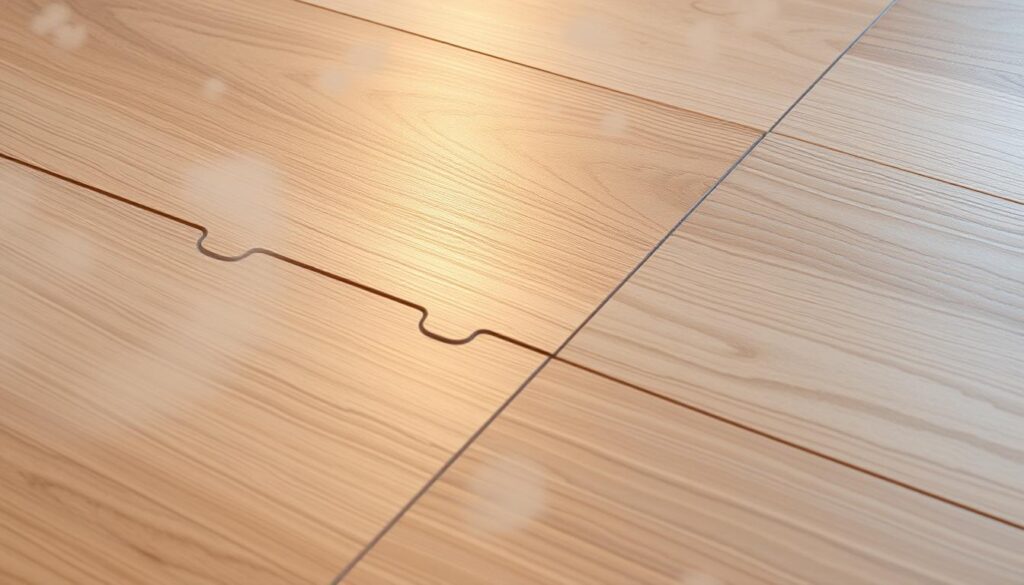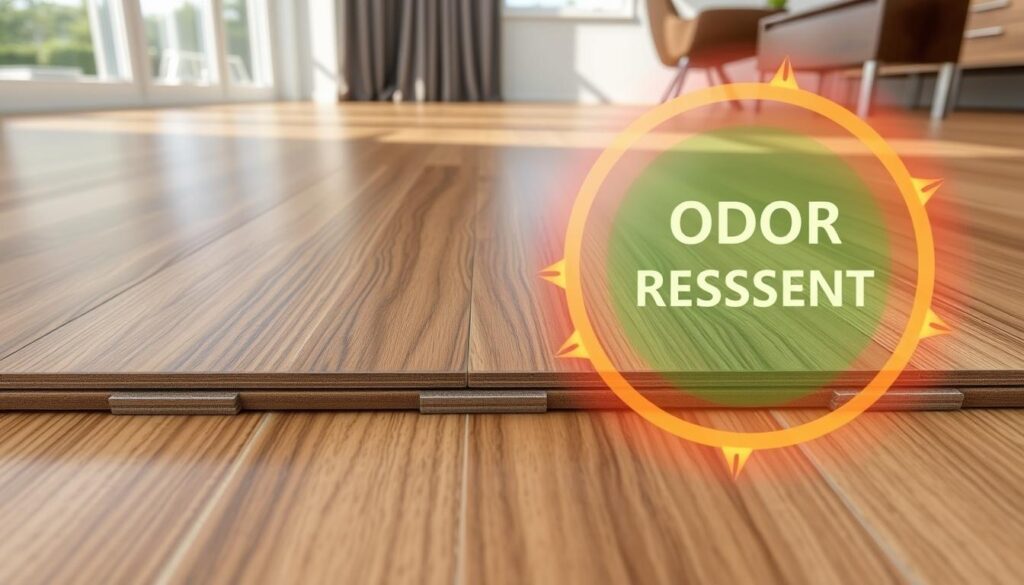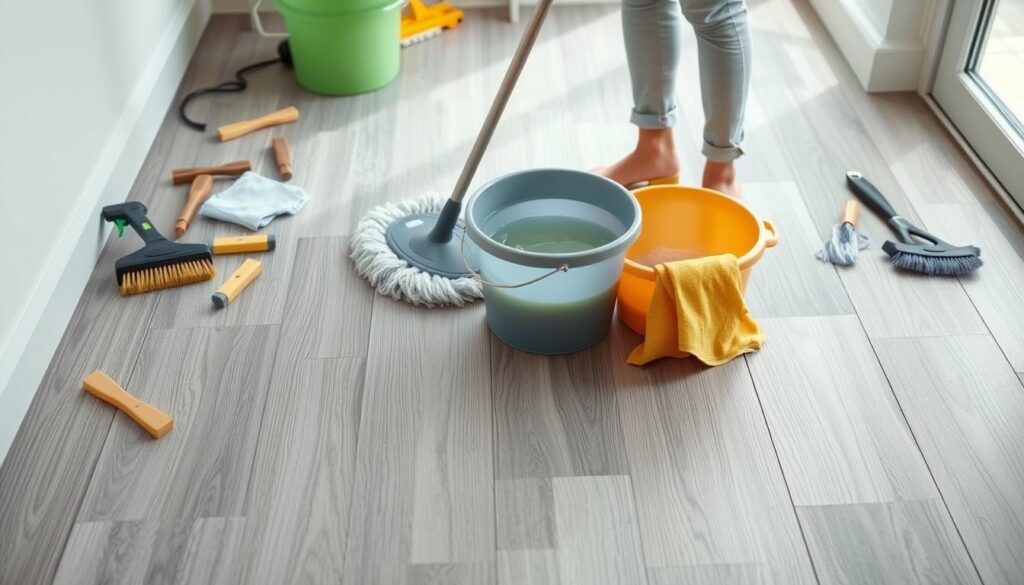Discover if can odor penetrate interlocking luxury vinyl plank flooring and learn effective solutions to protect your floors from unwanted smells and maintain freshness
Have you ever thought about how well interlocking luxury vinyl plank (LVP) flooring handles smells? Flooring can soak up and hold onto bad smells. But LVP’s special design might offer a way out. We’ll dive into the science of smell in flooring and see how LVP’s design fights off bad smells at home.

Key Takeaways
- Interlocking LVP flooring is designed to resist odor penetration and absorption.
- The core layer and wear layer of LVP planks play a crucial role in preventing odors from seeping in.
- LVP’s water-resistant properties help create a barrier against moisture-related odors, such as mildew and pet smells.
- Proper installation and maintenance of LVP flooring can further enhance its odor-resistant capabilities.
- LVP exhibits superior odor resistance compared to traditional flooring materials like hardwood, carpet, and laminate.
Understanding Luxury Vinyl Plank Flooring Construction
Luxury vinyl plank (LVP) flooring is loved for its toughness, simple upkeep, and wide design choices. To see how LVP keeps smells out, we need to look at how it’s made.
Core Layer Composition
The core of LVP is usually a strong, dense material like wood composite or limestone-based polymer. This core keeps the floor stable and flat. It also makes the flooring last longer and resist damage well.
Protective Wear Layer Features
The wear layer is on top of the core. It guards the floor against scratches and scuffs. Made from a tough, clear material, it also fights stains and smells.
Interlocking Mechanism Design
LVP floors have a special interlocking system. It lets you install the floor without glue. This system seals the planks tight, keeping moisture, dirt, and smells out. Its design is key to keeping smells away.
Knowing how LVP is built helps homeowners see its strength and smell resistance. This knowledge aids in choosing the right flooring that lasts and performs well.
The Science Behind Odor Penetration in Flooring Materials
It’s important to know how flooring materials handle odors. Odor absorption is key. This is how well a material can soak up and hold onto smells.
Materials like wood or carpet soak up smells easily. This is because they are porous. Porous materials let volatile organic compounds (VOCs) and other smells get deep inside. This makes it hard to get rid of these smells.
LVP flooring, on the other hand, is not porous. Its dense surface blocks smells from getting in. Plus, its design and water-resistant core stop moisture smells. This includes smells from pet accidents or spills.
“The key to maintaining a fresh, odor-free home is to choose flooring that resists odor absorption and is easy to clean.”
Knowing how flooring materials handle odors helps you pick the right one. This keeps your home smelling good. Call us at +6282332572828 or email info@timbertropics.com to learn more about LVP’s smell-blocking features.
Common Sources of Household Odors That May Affect LVP
Luxury vinyl plank (LVP) flooring is known for being tough and water-resistant. But, it can still get affected by household odors. Pet smells and cooking aromas can get into the LVP, making it smell less fresh. It’s important to know where these odors come from to keep your LVP looking good.
Pet-Related Odors
Pet owners often face the problem of lingering odors. Urine, feces, and dander can get into the LVP, causing bad smells. Quick cleaning and regular deep cleaning are key to avoiding these smells.
Moisture and Mildew Smells
Too much moisture can lead to mold and mildew. These can damage your LVP and make it smell bad. It’s important to keep the air moving and fix any moisture problems fast to avoid these smells.
Food and Cooking Odors
Kitchens and dining areas are where food and cooking smells are most common. These smells can stick to your LVP. Good ventilation, regular cleaning, and quick spill cleanup help keep your LVP smelling fresh.
It’s vital to tackle these common household odors to keep your LVP looking and smelling great. By being proactive, you can make sure your LVP stays a beautiful part of your home.
Can Odor Penetrate Interlocking Luxury Vinyl Plank Flooring
Homeowners often wonder if odors can get through luxury vinyl plank (LVP) flooring. They think LVP is tough and water-resistant, but can it block smells?
LVP is great at keeping smells out. Its strong core and top protective layer work together to block odors. This makes LVP a top choice for homes.
But, LVP isn’t perfect. Some smells, like strong pet odors or cooking smells, might get through. This depends on how well the flooring blocks odors.
To keep your LVP smelling fresh, clean it often. Use the right cleaning products to stop smells from building up.
“Luxury vinyl plank flooring is designed to be highly resistant to odors, thanks to its durable construction and protective wear layer. However, it’s important to address any potential sources of strong or persistent odors to ensure your flooring maintains its optimal performance.”
LVP’s ability to block smells is a big plus. It’s a favorite for homes with smell issues. With the right care, your LVP will stay fresh and smell good for years.

Benefits of LVP’s Water-Resistant Properties Against Odors
Interlocking luxury vinyl plank (LVP) flooring is great because it’s water-resistant. It keeps moisture out and stops bad smells from getting in. This makes LVP perfect for homes where spills or pet smells are common.
Moisture Barrier Technology
The core of LVP has a special moisture barrier. It acts like a shield against water and liquids. This barrier stops liquids from getting into the floor or the ground below.
It keeps the area dry and free from mold, mildew, and bacteria. These are things that can make smells bad.
Seal Protection Features
LVP also has seal protection to help fight off bad smells. The wear layer has a special coating. This coating makes the floor’s surface tight and non-porous.
This surface stops liquids and odor-causing particles from getting stuck in the flooring. It makes cleaning and keeping the floor smelling fresh easier.
LVP’s water-resistant features, moisture barrier, and seal protection make it a top choice for flooring. It’s durable and keeps your home smelling good. With LVP, your home will stay clean and smell fresh, even with daily challenges.
Maintenance Tips to Prevent Odor Absorption in LVP
Keeping your luxury vinyl plank (LVP) flooring in top shape is key to avoiding odors. Simple maintenance steps can help your LVP floors stay fresh and odor-free for a long time.
Start with regular cleaning to prevent odors. Sweep or vacuum your floors often to get rid of dirt and dust. For a deeper clean, use a damp mop with a cleaner made just for LVP floors.
Act fast when spills happen. Liquids, food, or pet accidents can cause smells if not cleaned up right away. Use a clean cloth to soak up spills, then mop the area with a damp cloth and the right cleaner.
- Don’t use harsh cleaners or chemicals on your LVP floors. They can harm the protective layer and make it harder for the floor to resist odors.
- Think about using a floor polish or sealant made for LVP. It can help block liquids and smells from getting in.
- Check your LVP floors often for any damage like cracks or gaps. Fix these quickly to stop odors.
By sticking to these maintenance tips, your LVP floors will stay fresh and beautiful for your home.
| Maintenance Task | Frequency |
|---|---|
| Sweep or vacuum | Weekly |
| Damp mop with pH-neutral cleaner | Monthly |
| Apply LVP-specific floor polish or sealant | Annually |
| Inspect for wear and damage | Quarterly |
Need help with LVP maintenance or floor care? Contact Timber Tropics at +6282332572828 or info@timbertropics.com.

Professional Installation Methods for Maximum Odor Protection
Proper installation is key to keeping your luxury vinyl plank (LVP) flooring smelling fresh. Experts know how to prepare the subfloor and seal it right. This ensures your LVP stays odor-free for a long time.
Proper Subfloor Preparation
Before installing your LVP, the subfloor needs a good clean and level. This step stops moisture and odors from getting trapped. Professional installers make sure the subfloor is ready for your new flooring.
Sealing Techniques
Sealing is also crucial for keeping your LVP smelling good. Experts use special sealants to block odors from below. This keeps your flooring looking and smelling great for years.
Choosing professional installers means your LVP will be well-protected. They know how to prepare and seal the subfloor. This way, your new floor will look amazing and stay odor-free.
Comparing LVP Odor Resistance to Other Flooring Types
Luxury vinyl plank (LVP) is known for its top-notch odor resistance. It beats out traditional hardwood, tile, and laminate floors. This is because LVP’s special design keeps out many household smells.
LVP is also water-resistant, which helps stop odors from getting in. Its core layer, made from a strong polymer, acts as a moisture barrier. This stops liquids and spills from reaching the surface.
Additionally, LVP’s wear layer is made to resist scratches and stains. This keeps your floors smelling fresh, even in busy areas or where strong smells are present. For more on LVP’s odor-resistant benefits, contact Timber Tropics at +6282332572828 or info@timbertropics.com.
FAQ
Can odors penetrate interlocking luxury vinyl plank (LVP) flooring?
Whether odors can get through LVP flooring depends on its materials and how it’s made. LVP is designed to be water-resistant and has tight joints. But, it’s important to install and maintain it well to keep odors out.
What are the key components of luxury vinyl plank (LVP) flooring construction?
LVP flooring has a core, a protective layer, and joints that lock together. The core, the protective layer, and how the joints are made all affect how well the flooring works and how it handles odors.
How do common household odors affect LVP flooring?
Odors from pets, moisture, and food can impact LVP flooring. How well these odors can get through depends on the flooring’s materials, how it’s installed, and how it’s cared for.
What are the water-resistant properties of LVP that help prevent odor penetration?
LVP’s water-resistant features, like its moisture barrier and seal, are key in stopping odors. These help block moisture and substances that cause odors.
What maintenance tips can help prevent odor absorption in LVP flooring?
Keeping LVP clean and managing spills quickly can help it stay odor-free. Using the right maintenance methods is key to avoiding odors.
How do professional installation methods affect the odor resistance of LVP flooring?
Professional installers prepare the subfloor and seal it well. This helps LVP flooring stay odor-resistant. Their methods create a strong barrier against odors.
How does the odor resistance of LVP compare to other flooring types?
LVP is better at resisting odors than many other floors. Its water-resistant design, tight joints, and strong build make it great for places where keeping odors out is important.
Related article :
